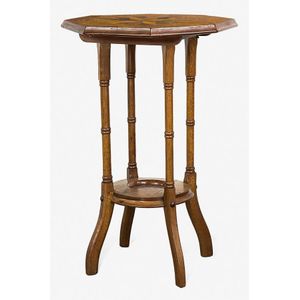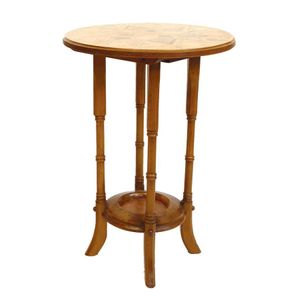Native Wood Inlaid Tilt-Top Wine Table
You must be a subscriber, and be logged in to view price and dealer details.
Subscribe Now to view actual auction price for this item
When you subscribe, you have the option of setting the currency in which to display prices to $Au, $US, $NZ or Stg.
- Kauri - An evergreen conifer tree associated with New Zealand, but also grown in northern Australia, and islands around the Pacific rim including Borneo, Vanuatu and New Guinea. The timber is generally golden in colour, and straight grained without much knotting.
A by-product of the kauri tree was the kauri gum, the fossilised resin extracted from the tree. The gum was obtained through digging, fossicking in treetops, or more drastically, by bleeding live trees. Kauri gum was used in the manufacture of varnishes and other resin-based products, and also crafted into jewellery, keepsakes, and small decorative items.
Kauri forests were prolific in the north of the North Island of New Zealand. European settlers in the 1700 and 1800s realised that the timber from these tall trees with broad trunks would be ideal for ship building and construction and a thriving industry was established harvesting the kauri tree. The forests were substantially reduced, and now the remaining Kauri trees that grow in New Zealand are protected, and there are reserves in various areas of the North Island.
The remaining stands of kauri in New Zealand are under threat from "kauri disease", a microscopic organism that causes dieback in the trees, with vast tracts either dead or dying. - Turning - Any part of a piece of furniture that has been turned and shaped with chisels on a lathe. Turned sections include legs, columns, feet, finials, pedestals, stretchers, spindles etc. There have been many varieties and fashions over the centuries: baluster, melon, barley-sugar, bobbin, cotton-reel, rope-twist, and so on. Split turning implies a turned section that has been cut in half lengthwise and applied to a cabinet front as a false decorative support.
- Platform Base - Flat-surfaced bases supporting the pedestals of dining tables and some other smaller occasional tables, including console and pier tables. Introduced during the Regency period, they continued in popularity throughout the 19th century. On tables, platform bases are usually of triform, or three-cornered shape, supported by bun, turned or carved claw feet. They may be either of veneered box-like construction, or formed from the solid timber.
- Burr - Burr (or in the USA, burl) is the timber from the knotted roots or deformed branch of the tree, which when cut, displays the small circular knots in various gradations of colour. It is always cut into a decorative veneer, most commonly seen as burr walnut on 19th century furniture.
This item has been included into following indexes:
Visually similar items

French oval side table with gilt metal mounts & stone top, 20th century. Height 80 cm, width 51 cm, depth 35 cm

William Norrie (attributed). Kauri specimen table the top inlaid with a star burst design in kauri and various other native timbers with a single shelf to the base and raised on splayed legs. Width 48 cm. Height 74 cm

A French satinwood occasional table, oval form, similar to above. 61 cm x 40 cm x 71 cm.

Georgian table, oak barley twist drop side oval top, extended 114 x 87 cm
